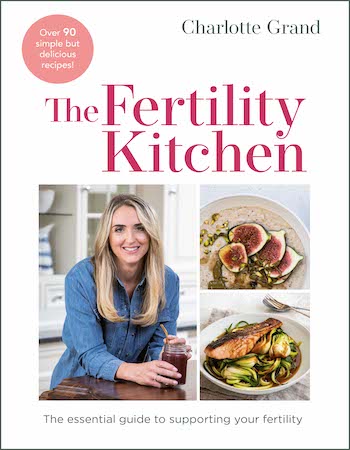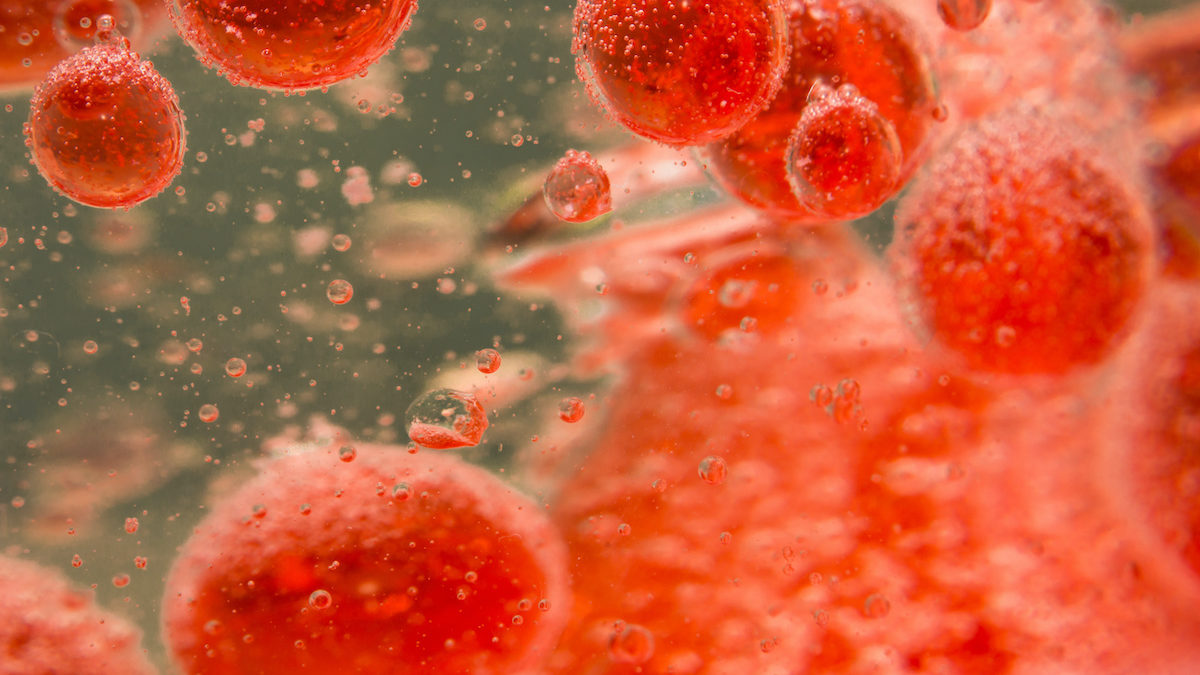A Nutritionist’s Guide to Adapting Your Diet for Fertility

Fertility rates across the world have been in decline for a number of years, with the total fertility rate – the number of children per woman – standing at 1.58 in England & Wales, almost half the post-World War Two peak of 2.93. There are a number of reasons for this — not least changing attitudes. But the statistics do suggest that there is a large proportion of women desperate for children who are struggling to conceive, with poor diet and a lack of nutritional knowledge a key factor put forward by experts.
 Charlotte Grand was one of these women. Charlotte and her husband had tried to conceive for three years before resorting to IVF. Determined to finally end the heartbreak and make it work, Charlotte dedicated herself to ongoing nutritional research in order to support her own fertility, resulting in the couple’s first child, George. The journey resulted in a career change for Charlotte, who gave up her career in fashion to become a nutritionist specialising in nutrition for fertility.
Charlotte Grand was one of these women. Charlotte and her husband had tried to conceive for three years before resorting to IVF. Determined to finally end the heartbreak and make it work, Charlotte dedicated herself to ongoing nutritional research in order to support her own fertility, resulting in the couple’s first child, George. The journey resulted in a career change for Charlotte, who gave up her career in fashion to become a nutritionist specialising in nutrition for fertility.
Ahead of the release of Charlotte’s new book, ‘The Fertility Kitchen: The Essential Guide to Supporting Your Fertility’, we asked her for advice on how to adjust your diet when looking to become pregnant for a comprehensive guide that’s also helpful for all women looking to keep their bodies healthy.
The Main Nutrients For Fertility
Optimal fertility nutrition relies upon a healthy balance of all three major macronutrients: carbohydrates, protein and fat. Micronutrients are required in smaller amounts and include vitamins, minerals and phytonutrients. They are nutritional superstars – every minute element of every function of every part of your body requires them. Even slight deficiency can have a negative impact on your fertility so it pays to make sure. Some key micronutrients for fertility include:
Folate
Your body and baby need folate to support methylation, which is vital to survival and controls the production of our most important antioxidant (glutathione). It also prevents neural tube defects which is the main reason that processed foods have been fortified with synthetic folic acid.
Iron
Iron is an essential mineral that we need to build the haemoglobin component of our red blood cells, which delivers oxygen around the body. Iron deficiency can cause anaemia which occurs either when we aren’t able to make enough haemoglobin or when we simply don’t have enough red blood cells. Anaemia has been shown to cause problems with fertility and can also contribute to pregnancy complications.
Your baby needs plenty of iron during pregnancy to build up a healthy blood supply and deficiency in the mother is associated with an increased risk of cognitive delays in infants. Premenopausal women are at a much higher risk of anaemia due to loss of blood every month through menstruation and women with heavy periods are more susceptible.

Vitamin B12
Vitamin B12 works with folate to support methylation, gene regulation, and gene expression. It’s also important to the formation and function of your baby’s nervous system during pregnancy and it supports cell differentiation, tissue growth, and organ formation.
Your red blood cells need B12 to function properly, and deficiency can lead to a type of anaemia called macrocytic anaemia, where the red blood cells grow overly large. Vitamin B12 has also been shown to support egg quality and deficiency correlates with lower fertility rates, poor outcomes during fertility treatment, and increased risk of early pregnancy loss.
Zinc
Zinc is an important antioxidant and has been shown to support fertility by protecting the health and integrity of egg and sperm cells.
Choline
Choline is a water-soluble nutrient and a relative of the B vitamin family. It has a similar function to folate and is known to support methylation and gene regulation. Choline is critical to foetal brain development and like folate has been shown to prevent neural tube defects.
Vitamin D
Vitamin D plays an important role in fertility. Deficiency is linked to a higher risk of infertility, poor outcomes during fertility treatment and chronic conditions that affect reproductive health like PCOS and endometriosis. Research has found that nearly half of women with PCOS are severely deficient in vitamin D.
Can Taking A Daily Multivitamin Help Fertility?
Supplements won’t make up for a poor diet, however, they can provide insurance against inadequate nutrient intake from food and provide extra fertility support. It takes a lot of nutrients to build another human from scratch and many women are missing out on some of the essentials needed to support a healthy pregnancy. You could unknowingly be missing a few nutrients in your daily diet and a prenatal multivitamin can help fill in those nutrient gaps and imperfections, so that both you and your baby have everything you need once you do get pregnant.

Fad dieting And Fertility
Dieting can play havoc with your hormones, which in turn can lead to ovulatory issues. Energy restriction can cause menstrual irregularities by suppressing the hormones that regulate menstruation. Your body will always prioritise survival over reproduction; having a baby during a famine doesn’t make sense.
Eating for your fertility should be about abundance, not deprivation. Instead of fad dieting, support your fertility primarily through a nutrient-rich, whole foods diet. Growing a baby is hard work, so by eating a nutrient-rich diet you will equip yourself with the building blocks your body needs to make a baby.
What To Cut Out
Alcohol
Limit to one small drink (e.g. one small glass (125ml) of organic red wine) per occasion (women) while trying to conceive; for men, one to two drinks per occasion (e.g. two small glasses (125ml) of organic red wine, or one to two bottles of beer, depending on the strength) and no more than four alcoholic drinks per week (both partners).
If you choose to drink, consider opting for an occasional small glass (125ml) of organic red wine with dinner. Red wine contains resveratrol (“a key ingredient in Form’s Radiant supplement”), an antioxidant compound that has potential therapeutic effects for improving ovarian function and male fertility. Ideally keep alcohol intake to an absolute minimum and avoid completely when you do get pregnant.

Lots of caffeine
Heavy caffeine consumption (four or more cups per day), even before pregnancy, has been linked with an increased risk of miscarriage. A lower intake may still increase miscarriage risk, which is reported to rise at 50–150mg per day during pregnancy.
|One cup of coffee contains 100–200mg, black tea contains about 50mg and green tea 25mg per cup. 1 cup of tea or half a cup of coffee per day is safest, or switch to decaffeinated. Pay attention to your body – if you experience headaches, jitteriness or anxiety after drinking it, then it’s best avoided. Avoid caffeinated soft drinks and energy drinks and consider avoiding caffeine completely during IVF and once you become pregnant.
Unhealthy fats
Steer clear of processed vegetable oils and trans fats. These are the worst fats that you can eat. Vegetable oils need to be extensively processed because they don’t give up their fats easily. This processing includes chemical treatment, high heat and toxic solvents. These oils are very susceptible to oxidation and consuming them is detrimental to your health and fertility.
Trans fats are vegetable oils that have been hydrogenated. The highest levels of trans fats are found in margarine, processed snack foods, frozen dinners and fast food. Vegetable oils also hide in some plant milks and hummus.
Debunking Fertility Old Wive’s Tales
Pineapple and improved embryo implantation
There are a few popular traditions in the fertility community. The first is pineapple and its ability to improve embryo implantation. Pineapple contains an enzyme called bromelain and it’s the core of the pineapple that is most concentrated in bromelain. There have been some studies that show that bromelain may have anti-inflammatory properties and can help thin the blood, and it is these properties that may help with implantation.

However, there’s no clinical evidence that supports these claims as there haven’t been any studies on pineapple and implantation. If you want to include pineapple in your diet, go ahead, just bear in mind that it’s a sweet fruit to be eaten in moderation, and you would need to eat the core if you’re eating it to help support implantation.
Pomegranate juice to support womb lining
Finally, many women swear by drinking pomegranate juice to support their womb lining for implantation. But again, there isn’t any clinical evidence that it can do this.
The other thing to be mindful of is that pomegranate juice is high in sugar; it contains about 15 percent sugar (15g per 100g) and ideally when you’re choosing packaged foods you want them to contain no more than 5 percent (5g per 100g). At three times the recommended amount, I advise avoiding pomegranate juice.
‘The Fertility Kitchen: The Essential Guide to Supporting your Fertility’ by Charlotte Grand is out on 23rd June (Quercus, £16.40)


















